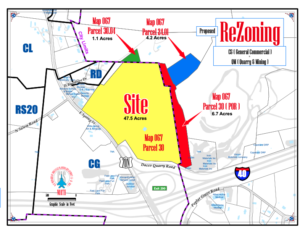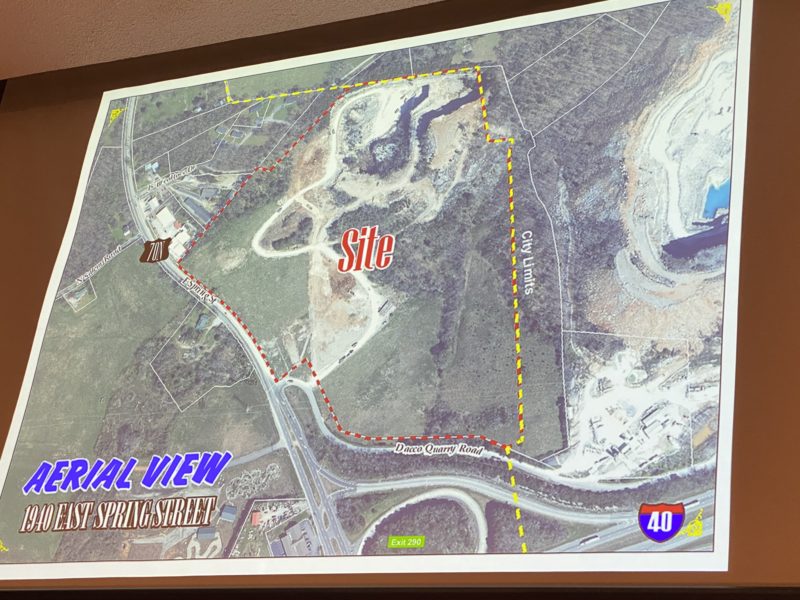COOKEVILLE – One company’s attempt to develop property at a key interchange of Interstate 40 was recently denied by Cookeville’s City Council, even after it was recommended by Cookeville’s Planning Commission. As a result, accusations of back-room politics and anti-competitive behavior are developing at a rapid pace.
On Oct. 15, the Cookeville City Council denied a request to change the zoning of the old quarry property on East Spring Street at Interstate 40 from GC (General Commercial) to QM (Quarry Mining). The council’s decision was rendered following a required public hearing — and at least one closed-door meeting, with very little public discussion amongst council members.
Property owner RQ Materials, LLC had requested the change to allow for an easier approach to flattening the property, making it ripe for new development. RQ Materials Co-Founder Barry Reese told the UCBJ the zoning change would have allowed them to be more efficient in preparing the property for development, cutting the time needed from 15 years to about half of that. The rezoning would have even led to cheaper crushed stone for local home developers, which could have been passed on to the end users in lower home pricing.
In light of the lack of transparency surrounding the decision to deny RQ’s request, the UCBJ recently sat down with Reese to discuss his plans for the quarry, his experience with the city and what the future now holds for the project.
UCBJ: Can you explain why you approached the city for a zoning change?
Barry Reese: Ultimately our goal is to take the topography of that site down to a flat level surface in order to give us, and the city of Cookeville, 55-60 acres of land on the corner of I-40 and Highway 70 – on the last major intersection that really can do something like this – in order to help our community continue to grow and foster more development — whether it’s commercial, whether it’s retail, whether it’s residential. We have a vision of that place being all of the above.

I’m not saying it could ever become a Mt. Juliet with that much stuff, but it could certainly be a smaller version of that, where you have a lot of retail or a mixed-use development, maybe a little residential on the back side closer to the back wall. It’s a vision for us just to try to get that down so we can use that site, because for the last 50 years it’s been nothing but a high wall and a pile of dirt.
It was a quarry – the rock that helped build I-40 came from that site.
We only requested the Quarry/Mining zoning change in an effort to help us be more efficient, effective and reduce some costs on getting material off there. It wasn’t to be a long-term quarry.
UCBJ: What process have you gone through to start quarrying?
BR: We went through the process and got all of our permits through the state, doing everything according to the guidelines and rules and regulations, and then we went to talk to the city. They have some history there, history that says that quarrying is bad and there’s been damage before. The citizens of Cookeville, just in general, have a negative connotation of that.
But we’re in the same little corridor where there’s two other quarries, on each side of us, which can do what we’re asking to do. We tried to just say what we’re doing is the same exact thing – except for not trying to go dig and create a scenario where this is a viable business for the next 30 years like the guys on both sides of us are doing.
UCBJ: So the end game is not a permanent quarry?
BR: We’re trying to get rock off so we can have a flat level development site. The whole issue with what’s going on with the city and everything, is in my opinion, politics. It started off with our competitors, who didn’t like another person coming in — even on a short-term window — and selling rock and taking market share from them.
So, every bit of the issues that have come up, like the postcards that went out -obviously anonymous – really, who’s going to take the time and effort to do that except someone who is trying to keep their stranglehold on the market? We don’t have 100% proof of that, but we have a real solid certainty that it was (competitors) doing that, trying to get the community riled up to say that our request was a bad thing.
Don’t get me wrong: I think competition is good. We certainly talk with a lot of homebuilders and a lot of developers in the area who are appreciative that we can come in with a price point that makes them be able to manage their projects and end up developing good quality things at a cost that everyone can be happy with going forward. They don’t feel like their hands are being tied by someone who controls the lion share of the market and they can’t get product at a decent price. So, we’ve had a lot of positive feedback there.
When we went to the city to get the QM zoning, we were led to believe that the city wanted this to happen and would approve it. In numerous ways, with even one City Council member sitting on the Planning Commission who had several suggestions, all of which we answered and implemented. But in hindsight, it appears that there were a lot of other conversations occurring behind the scenes – not made public – and that ultimately led the full City Council to vote against the planning commission recommendation — all based on a “2030” vision that we had never heard of in the process.
UCBJ: There were negative comments about the blasting at the Public Hearing. Any comments about that?
BR: I can assure you that nobody knows who blasts when. And the truth is, blasting is going to occur there no matter what, because of all the businesses operating in that area. The complaints couldn’t even isolate if the blasting was due to us, Vulcan, or Rogers Group. And, I would go so far as to say that we’ve been very mindful of the size of the blasting, the quantity of rock being moved in blasting, because of our neighbors. And I think if they really want to dive in and go analyze what day things may have fallen or may have rattled in their houses, they would find that we were not the culprit.
UCBJ: Were there ever any questions at all about the project when it was approved through the planning commission?
BR: The planning commission, who is supposed to monitor and decide on these things, never once brought up this 2030 long-range plan as a reason to approve or deny it.
The planning commission did however, right before the planning commission meeting, come to us and say, ‘Hey, would you be open to having a 600-foot barrier (along Highway 70) that you cannot crush’ – and again no one, even most people on planning commission or city council, know what quarry versus not quarrying means. But they said a 600-foot barrier was necessary where you cannot quarry in that area. That, not incidentally, was an issue brought up by Councilman (Eric) Walker to help resolve some confusion and possible matters. So we agreed to it, and thought that was a resolution everyone would be happy with.
Remember, the only reason that we were trying to do this was to be efficient in our process to maximize the amount of material we can get off of there in a timely manner. That’s all we were trying to do. So, we were not going to be anywhere close to that road. And we, in good faith said ‘sure.’ They (the planning commission) all voted to approve it, except for one abstaining.
UCBJ: Then it went to the City Council?
BR: Yes. But all of a sudden, we then started having multiple and odd conversations with the city – whether it was a City Council member or the city planner – and they all came back with a new concern or issue: whether it was they didn’t like the way we handled it before, or we didn’t have 50 acres and that was part of the zoning law, even though they were the ones that asked us to put that barrier in. They came back multiple times with all these reasons, and we addressed every single one of them.
We told them here’s what we can do. We went so far as to go make sure that we had an extra acre of land in order to abide by the rules that were set 20 years ago. So, we went and got an extra acre of city land that touches ours in an effort to just make sure there were no roadblocks. And then at the meeting, they listened to us and the community speak for an hour as to the pros and cons of what quarrying is and then brought up a completely different reason – the 2030 long-range plan – as a reason to deny it, and that’s something that had never once been brought up in the planning commission process.
It was obviously communicated amongst the group ahead of time that they were looking for the best reason in their mind to deny us, and I mean ultimately, from my perspective, they were more worried about something in the past coming back to bite them than worried about us actually getting zoning.
UCBJ: Right now, you collect rock on 50 acres and then process it on adjacent county property, and the city has no control over you. If they would have approved the zoning change, wouldn’t it have allowed them to have some control?
BR: We actually wanted them to use that as a reason to approve us. We don’t mind the control. We’re going to control ourselves. If it was moved into the city, it helps us from an efficiency perspective. That’s the only reason why we asked for the zoning to begin with. And in good faith, we wanted to work with the city. We want it to be efficient for us, but we weren’t scared of any rules or oversight or anything like that, because we’re doing it the right way.
They chose to deny it. I don’t think because they’re worried about what we’re doing. They’re worried about developers having asked them to do this before and they’ve told them no.
Ultimately that’s the whole reason why I’m still pushing. Fact is, we don’t really need the quarry zoning. We’re now in the county and we could choose to stay focused on that solution. But, bottom line, this is about a smarter use of the property and more efficient costs that benefit everyone, from the city down to individual homeowners who would be buying crushed rock. The city should be supportive of that, not playing politics behind the scenes with it.
Not only for my property, but for all future property developments, I truly believe there should be a lot more transparency on matters like this.
UCBJ: What was going on with the property before you bought it?
BR: For the two years prior to us acquiring this property, Rogers Group bought all the material. The guys that owned it before us did everything we’re doing – blasting, grading and trucks on the road. Plus, they sold everything to Rogers Group. So, that material got on a truck drove down the road, went to Rogers Group, got crushed and back out on the road. It was doubling the amount of traffic on the road with dump trucks. We’ve actually reduced the amount of road time by doing the crushing on site.
UCBJ: There has been talk of complaints about the quarry. What do you have to say about that?
BR: I can tell you that TDEC (Tennessee Department of Environment and Conservation), MSHA (Mine Safety and Health Administration) and APC (Air Pollution Control), all those are state organizations, whenever anybody calls in, they have to go address it or check it out. Every single one of those calls is anonymous in nature. The only people that are going to do that are those who don’t want us competing in the rock business.
UCBJ: So, you are going forward with your plan? How will being adjacent to the Vulcan quarry affect your future plans for the site?
BR: It won’t. With the development that we’re looking to do, it won’t make any difference whether there is a 200’ high wall or a pile of old dirt there.
We have to abide by every rule and regulation that the state of Tennessee has for any quarrying spot in the state. We have and will continue to do that. But on the local level, there’s not another major municipality in the state that has a QM (quarry/mining) designation. If you go to Franklin, Nashville, Smyrna, every one of those has quarries right in the middle of the city, and they have to abide by the rules and regulations. It happens in every municipality. Cookeville is the only one that created this thing in an effort to keep any more quarries from coming into the city, because of what happened 20 years ago. We get that. But if you go by the rules and the laws and you do things the right way, there should be no reason why we can’t get the rock off this in an efficient manner, be able to sell that rock in order to offset our costs in an effort to make that corner of I-40 and 70 ultimately be a development that benefits the city of Cookeville.









